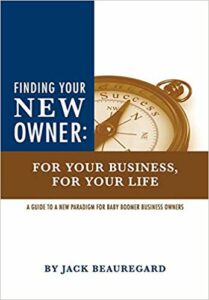Even with the odds against a successful business sale, we read almost daily about the spectacular exits. The ones where the owner makes millions after working for 2 years. But what about other business owners? The ones that don’t get away.
Jack Beauregard’s book Finding Your New Owner, describes the successful way out of your business, but also shows there are a lot of ways to do it wrong. Here’s an excerpt from chapter two:
Fifteen Ways to Leave Your Company Unsuccessfully – and How to Avoid Them

-
Carl F. was the owner of a firm that manufactured consumer electronic products. When he began thinking about the possibility of leaving his company, he would swing from one emotional extreme to the other. Sometimes he felt that he could not wait to leave his firm; other times, he woke up in a cold sweat, caused by the very idea of leaving his business. He continually distracted himself from the larger question of “What should I do with my company?” by focusing exclusively on his daily “to‐do” list. He was never able to take the next step to begin the process of actively transitioning out of his company, and he is still there.

-
Allen G. owned a company that manufactured promotional products for other businesses and organizations. He thought he wanted to sell his company, but wasn’t really sure. Constantly going back and forth thinking about what to do with his company diverted his time and attention away from running the business. Allen eventually contacted a CPA who began to do the necessary work to help sell the company. Then the CPA got a phone call from Allen, saying that he had changed his mind and no longer wanted to sell. As a result of being unsure about their futures, Allen’s employees became demoralized, which resulted in reduced productivity and lower profits for the company. Also, Allen’s decision not to sell his company after it had been listed reduced its value and led to reduced sales revenue, since the customers became unsure whether the company would remain open. A year and a half later, Allen again decided that he wanted to sell the company. But this time, having been burned once, his CPA did not put a lot of effort into helping him sell it. Other business intermediaries that Allen went to were also reluctant to spend their time and energy trying to sell his company, because Allen had pulled it off the market once before for no apparent reason. Allen never sold his company, and he is still running it.

-
Philip H. was a high‐tech manufacturer who had built his business over the past 20 years into a company with annual sales revenue of $17 million. Deciding that it was time for him to sell, Philip went to an M&A firm and paid them a retainer to sell the company for him. The M&A firm found a buyer, they were three‐quarters into the transaction, and Philip was saying all the right things at the conference table. Suddenly Philip got “cold feet” and killed the deal for no apparent business reason.

-
Karen J., in her sixties, had built a successful retail business over many years and was highly respected in her industry. She hoped that her son, who had occasionally worked at the company, would take over the business when she left. Meanwhile, her son had begun attending a prestigious business school. When Karen asked him when he might be ready to join her company full‐time, he was non‐committal. He was meeting some really exciting professors and other business owners through his school, and Mom’s business was no longer appealing to him. With her son out of the picture, Karen didn’t have a “Plan B” for a successor.

- George K., co‐owner of a successful real estate business in New York City, was raising his family in an exclusive suburban community near the city. His kids went to excellent schools, his youngest to a prestigious school in Boston. Then George died suddenly. It took two years to settle his estate because he had not planned well with his partners. Because of his poor planning and denial of his own mortality, the business floundered, his wife had to get a job quickly and their daughter had to leave her prominent school.
- Tom L. was a builder who spent 30 years growing his business. In his sixties he sold his share of the company to his younger partners for a good financial settlement. To fill his time, Tom now spends his days doing chores and making things in his workshop in the garage (his wife doesn’t let him smoke in the house), but this does not make him happy. He ponders what else he could be doing, but can’t find any answers. He feels completely alone.
- Robert M., who owned a medical device supply company, successfully sold his business to a larger company in the same field. Robert was used to spending 60 to 70 hours a week at work. After selling his company he moved to a small town in the southern U.S. where he hoped to find new work as a consultant, but was unable to find clients. Robert now had too much time on his hands, and he began doing things for the sake of “killing time.” One morning he woke up and realized that his new life was meaningless. Even though he was constantly busy, his activities didn’t give him a sense of purpose. Robert felt like a gerbil in a cage – running all day and going nowhere.
More ways to do it wrong, and the way to do it right can be found here:
